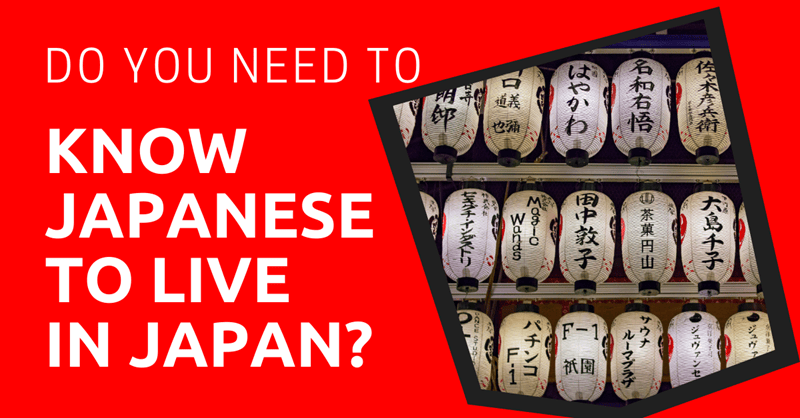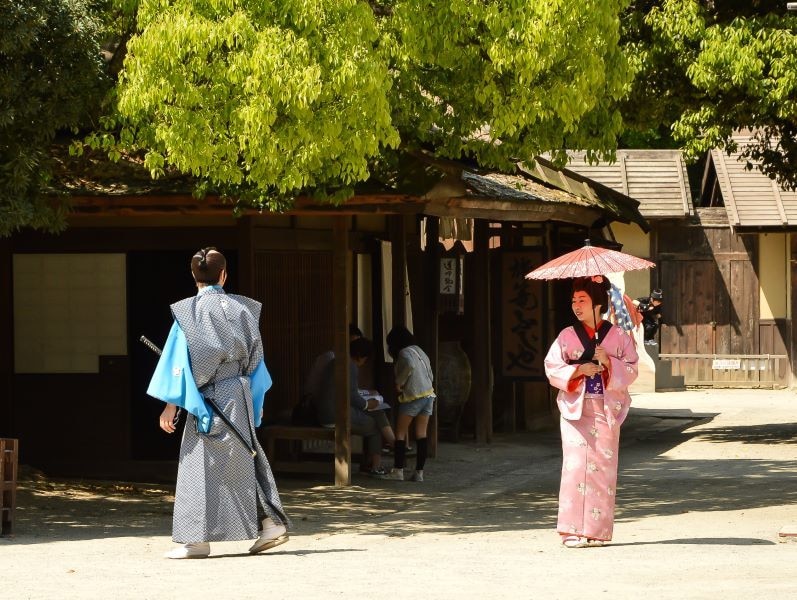
The answer to this question depends on who you ask and is specific to your personal situation, but I can say with utmost confidence that actively studying the language has been crucial for my life in Japan.
Unless you’re planning to live in the massive city of Tokyo, where the use of English for signs, menus, and other landmarks is more prevalent, you’re going to want to invest time in studying Japanese to help you navigate all aspects of your new life.
In this article, I am going to show you different daily life scenarios, so that you will have more ideas about whether or not you need to know Japanese to live in Japan.
In addition, I’ll also tell you about the additional benefits of learning Japanese and give you different sources and materials to start off on the right foot.
This article will take approximately 13 minutes to read. Don't have the time right now? No worries. You can email the ad-free version of the article to yourself and read it later!
Disclaimer: This article may include links to products or services offered by ExpatDen’s partners, which give us commissions when you click on them. Although this may influence how they appear in the text, we only recommend solutions that we would use in your situation. Read more in our Advertising Disclosure.
Contents
Navigating Daily Life
How do I ask “where are the eggs in the grocery store?”, I have been walking around the aisles looking at signs I don’t understand for 10 minutes now. I have to open a bank account, apply for a credit card, make a hotel reservation, buy a commuter pass at the train station, and pick up some cold medicine from the drugstore.
The list of daily things to do, that if they were in English you would have absolutely no problem with, are suddenly mini missions that you have to overcome in order to get the task done if you do not know Japanese.
I will give you a short rundown of some daily life activities in Japan to give you an idea of how you can deal with it if you do not know Japanese.
Eating Out
Unless you visit a small local restaurant, you will have no problem eating out in Japan at all.
Many restaurants in Japan offer menus with pictures, and some even have English menus. You can just point and order your food.
By simply saying, “Kore o onegaishimasu” (Please, this one) and indicating with your finger what you want, you can order individual items.
One great thing to ask is, “Osusume wa nan desu ka“, which means what do you recommend.
It is a magic Japanese phrase that will allow you to get delicious food and drinks wherever you go.
Here is a great list of essential Japanese for dining out.
In a modern restaurant, you can order directly from a tablet menu or a menu vending machine.

Buying Groceries
You will have no problem buying groceries in Japan. If you cannot find an item you are looking for, just show a picture to a staff member, and they can help you with it.
Renting an Apartment
If you don’t know Japanese, it’s going to be very difficult to find a place to rent.
Many rental agencies will insist that you be able to read the Japanese contract before signing, and this may not be possible without an interpreter and translator.
Recently, hiring translators to help with these types of tasks has become much easier due to freelance services. You can try to find a freelancer in your area who can accompany you to the realtor for a fee.
To make it easier on yourself, finding an English-speaking agent that caters to expats might be your best first step. Rental websites or online portals like this one have nationwide housing services for foreigners that are very reasonably priced.
If this is not the route you wish to take, you will have to make a comprehensive list of Japanese you may need for the process, or better yet, find a Japanese friend or coworker who can help you.
Dealing with Banks
In order to open a bank account or apply for a credit card, Japanese is typically required.
While international or large domestic banks may have English-speaking staff and an English online application process, having Japanese phrases prepared for the process is a better guarantee that you will be able to open an account right away.
For credit card applications, while you can apply for a credit card online, the application will be in Japanese.
In this case, I recommend using Google Translate to translate the page into English when applying, or copying and pasting each line into translation software to double-check you are filling it in correctly.
Visiting a Hospital
If you cannot speak Japanese, you need to visit a hospital or a clinic with English-speaking staff.
These hospitals and clinics are mainly available in big cities only. However, the number isn’t a lot at all, and not all medical staff can speak English well.
So, you may need to bring your Japanese friend or hire a translator instead.
Traveling
In this particular category, you may be in luck. Major cities and tourist destinations often have signage in English, especially in public transportation areas.
On top of this, travel apps for your phone have all the information you need.
You don’t need Japanese to travel, but if you are really unsure of where a train is going, you can always ask, “Kono densha wa (insert destination) ni ikimasu ka?” (Does this train go to …..?).

A station attendant will politely help you find your way.
Ticket stations are also clearly marked, however, if you are not sure where to buy a ticket, you can ask, “Kippu wa doko de kaemasu ka?” (Where do I buy a ticket?). You shouldn’t have much difficulty getting from place to place in Japan; traveling is fairly carefree.
How About Translation Apps?
While you may think you can depend on voice features in Google Translate or another phone app for conversation, you will quickly find out that it can be more of a nuisance than an asset.
The contextual nuances of the language and varying patterns of speech, dialect, and formality will sometimes result in voice-translated conversations requiring multiple attempts to be understood by both parties.
Preparing some preliminary Japanese ahead of time on paper (or a memo on your phone) with key words ahead of time will make daily life run much more smoothly.
Additional Benefits of Learning Japanese
In addition to living in Japan easily, there are many benefits to learning Japanese when you live in Japan.
Building Relationships
Whether it’s co-workers, neighbors, new friends, classmates, or a new love interest, without Japanese, you are limiting yourself to a narrow group of people. A foreigner in Japan is known as a ‘Gaikokujin’, or in a shortened and less polite form, ‘Gaijin’; this is translated as outsider, but its meaning is someone that is not from Japan.
Many foreigners who live here long-term without studying Japanese will find themselves in a ‘Gaijin bubble’, with a circle of friends who communicate entirely in English while living in Japanese society.
While there is nothing fundamentally wrong with this choice, it can have a negative impact on your ability to form meaningful connections with the Japanese people you live around and work with, mainly in that you never learn how to properly communicate with them.
That isn’t to say that you can’t exist in two spheres or language communities simultaneously, but in order to do this, you must take the first steps in learning Japanese so you can at least have a polite conversation.
You would be surprised how many long-term expats never do, and before they know it, 10 or more years have passed and they have lost their enthusiasm to study.
Career Opportunities
If you’re considering working here, knowing the language can open you up to a much broader range of career opportunities. Excluding the role of assistant language teacher (ALT), many companies in Japan require at least a basic level of Japanese proficiency.
Some websites, like Daijobs, specifically look for foreigners who have completed their nationally sponsored Japanese Language Proficiency Exams (JLPT), and recruit with this as a baseline for considering you for a position.
Mutual Cultural Understanding
You often hear people say that language is the window into a country’s culture, and while this is a cliché, it certainly is true that it will give you a much deeper appreciation of how the people around you think.
The effort that you made to try and understand (and speak) Japanese does not go unnoticed.

The Japanese are aware of the difficulty of their language, and they know that people from English-speaking countries who studied Japanese put in the time to learn it.
Beyond the benefits of cultural understanding that come from language acquisition, there is also a degree of respect that you might receive from the people around you.
Recommended Self-Study Courses and Learning Tools
I want to cover the basics here and give you a selection of study resources.
Since knowing Japanese is important to live in Japan, I will provide you with a selection of study resources that will put you on the path to success.
These learning tools have helped me immensely.
Firstly, for general information on the Japanese language and culture, before you dip your toes in the water, so to speak, I suggest Tofugu as a starting point. It really has a wide range of invaluable information for anyone starting out.
You will also want to get a trustworthy dictionary app on your phone.
For Kanji study from the ground up, I can’t express how well-designed the WaniKani system is for learning to read. While this mnemonic learning system costs about 9 dollars per month, if it were not for the WaniKani system, I would not be able to read Kanji today.
I suggest taking it slow, committing the kanji to memory, and not trying to rush through the levels.
The best resources for grammar I have personally used are: Tae Kim’s Guide to Learning Japanese and Bunpro.
Both offer English support from the beginner levels of Japanese and have easy-to-understand methods for memorization.
The runners-up for excellent resources are: Maggie Sensei, Japanesepod101, and for excellent speaking practice, Preply for 1-on-1 speaking tutor practice.
Some of the more popular textbooks are Genki and Minna no Nihongo. However, while they do cover grammar, vocabulary, kanji, and provide listening practice, it may be best to use these in a classroom environment with a teacher or tutor.
If you decide to use textbooks, complement them by immersing yourself in the language whenever you can.
Make sure to supplement your free time with Japanese films, anime, and dramas, listen to Japanese music or podcasts, and read Japanese books or manga.
Survival Japanese for Beginners
While there are countless guides and websites that offer basic survival phrases in Japanese, you will need to anticipate your needs individually and prepare for them in advance.
For instance, knowing that you will need to open a bank account, you will want to write down key words and phrases in advance.
Some people do little preparation and deal with situations as they arise. To a degree, this is to be expected, but building your own phrasebook (or making a situational list on your phone) is worth your time.
You will be glad that in the moment you have the phrases and words you need already organized and ready.
A common-sense approach should include greetings and basic phrases, numbers and time, a basic food and drink vocabulary, and a head start on the Japanese you will need for self-introductions at work.
Is Studying Japanese Worthwhile?
I committed to studying Japanese about 13 years ago, and I am still studying today.
The more you learn about the Japanese language, the more you realize how much you still don’t know.
It is a process that has no particular “right way,” and every learner excels in a different area after spending enough time with the books working hard to learn it.
All that I know is, I am happy I took the first step on my learning path and decided it was important to my survival in Japan.
Now, on to You
While it’s possible to live in Japan without knowing Japanese, learning the language can significantly enhance your experience in every way. In the next article, I will talk about some hacks and tactics for the person who is not interested in studying Japanese but still wants to make a life for themselves in Japan.
Here it is: How to Live in Japan Without Learning Japanese?







